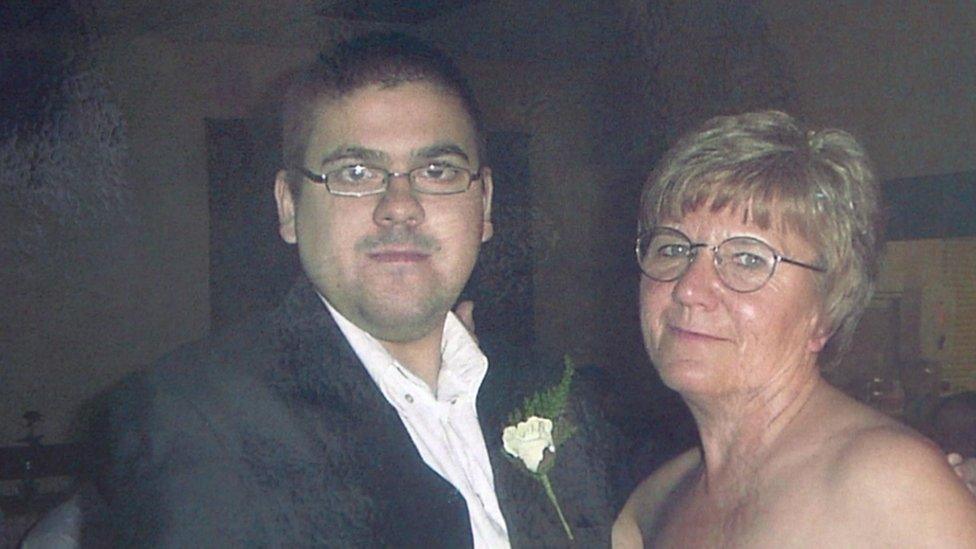Rent-to-own firms 'selling to vulnerable people'
- Published
Ed Miliband: "We need more rent-to-own regulation"
Rent-to-own companies are selling products to vulnerable people with mental health problems and learning disabilities, the BBC has found.
The firms allow customers to pay for a household item in instalments, with high interest rates, until they own it.
Citizens Advice worries that vulnerable people are being "pushed into further financial difficulty".
BrightHouse - the biggest company - denies exploiting consumers in vulnerable circumstances.
During an investigation for the BBC's Victoria Derbyshire programme, former Labour leader Ed Miliband called for better and clearer regulation of the rent-to-own sector.
"It seems to me that too often rent-to-own companies are taking advantage of people who feel they have nowhere else to go. The regulator needs to stop the most vulnerable people in our society, like those with learning difficulties, being taken advantage of," he said.
"Paul", who has asked us to hide his identity, has learning difficulties and mental health problems. At one stage, he was paying BrightHouse for five items - including furniture and electrical goods - using his welfare payments.
Asked how he had taken out the five items, he said: "I think I must have started paying off one... I don't know how it worked really, I don't know."
As Paul wished to remain anonymous, BrightHouse were not provided with sufficient information to comment on his individual case, but the firm has denied exploiting consumers in vulnerable circumstances and selling items to people who cannot afford them.
It said it has sufficient policies and procedures in place to prevent these practices from happening.

Craig's story

Craig, 38 - whose surname we have withheld - has autism and cerebral palsy.
He signed an agreement with BrightHouse for a games console, but his mother Betty Ward said he did not understand the original contract.
"He understood it was a PlayStation 4, that was about it. He'll pay, but then he's got nothing for himself for food, electric, gas, things like that.
"I kept seeing it in the house and I didn't really twig... when he said where it was from I was like, 'How many times have I said don't touch them with a bargepole?'"
She said it would have been obvious to staff that her son was vulnerable, although BrightHouse disputed this and said a member of staff judged Craig to be capable of making his own decisions and had no reason to believe he was not aware of what he was doing.
As soon as Ms Ward told the firm about Craig's situation and the console was returned, she says, BrightHouse stopped taking payments from his account.

Citizens Advice said it receives thousands of complaints every year about the sector, and has evidence suggesting affordability checks were not always being properly conducted by firms.
It said it encountered people with up to several thousand pounds' worth of debt, with six or seven items.
Its chief economist, Hugh Stickland, said it sees "people in vulnerable situations pushed into further financial difficulty - and then, of course, emotional stress and worry.
"Too often we think the [rent-to-own] firms offer them very little in terms of protection, don't do decent enough affordability checks."
'Costs can spiral'
The Financial Conduct Authority, which has regulated the sector since 2014, says if companies have reason to believe a customer has a learning disability they must take reasonable steps to assist them in making an informed decision, and decide whether it is appropriate to lend.
But Mr Miliband, who has campaigned against rent-to-own companies and supports credit unions, thinks this does not go far enough. He wants the firms to be regulated in a similar way to payday loan companies, and see a cap on the total amount they can charge for a product.
"I have been told customers can end up paying three times the worth of the item, or if they miss a payment or are late, the costs can spiral," he said.
The difference in an item's worth and the amount customers pay overall is due to additional costs for delivery and installation, a mandatory warranty and high interest rates.
One mid-range washing machine on BrightHouse's website costs £358. But the firm's customers must also pay £55 for delivery and installation, and £136 for a warranty. With interest rates on this product of 69.9% a year, if the payment was spread over three years - as the firm's own price model sets out - the washing machine would cost a total of £1,092.

Rent-to-own
Rent-to-own firms are often used by people who cannot afford to buy a product outright, or cannot get credit.
Consumers take out an agreement to buy a product and then pay weekly instalments until they own it - similar to a hire purchase agreement.
But customers could pay much more than the actual cost of the product due to high rates of interest and extra costs such as a mandatory warranty.
More than 400,000 households use the sector, a 131% increase on 2008.
The biggest firms are BrightHouse and Perfect Home.

But Kate Andrews from the Institute of Economic Affairs, a right-of-centre think tank, believes the rent-to-own companies provide a valuable service. "It is an injustice to tell people at the bottom that because they're poor they can't have things that in 2016 we would consider necessities," she said.
She believes it is fair that if rent-to-own companies make "huge profits" because they are "taking on a lot of risk - taking on people with no credit score.
"They don't always know if they're going to get their payments," she adds.
BrightHouse said in a statement: "[Mr Miliband] consistently misrepresents our business. BrightHouse serves those lower-income families who are excluded from mainstream credit. Rent-to-own is a very different proposition to other forms of retail.
"We undertake extensive affordability assessments before lending and seek to support all those customers who find themselves in difficulty."
The Victoria Derbyshire programme is broadcast on weekdays between 09:00-11:00 on BBC Two and the BBC News channel.
- Published10 February 2015
